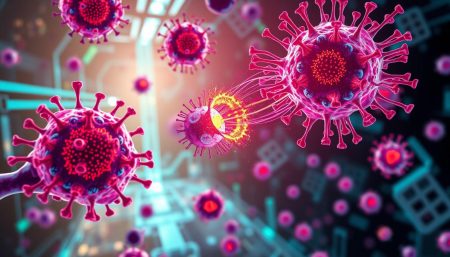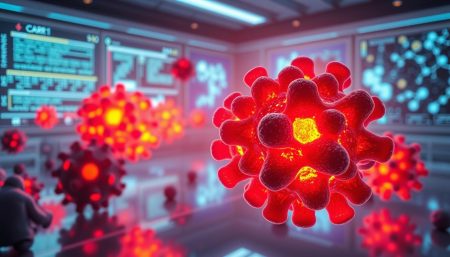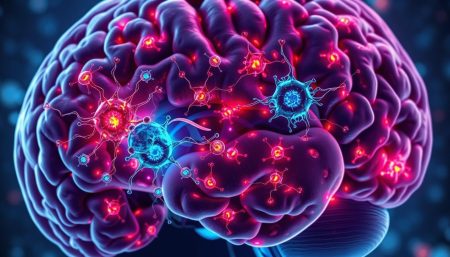The fight against cancer is getting better, thanks to cancer medication advancements. Scientists and doctors are working hard to find new ways to treat it. Now, patients have more cancer treatment options than ever before.
This includes old favorites like chemotherapy and new ideas like immunotherapy and precision medicine. These are all key parts of today’s tumor therapy.
Learning about cancer treatment is all about understanding the disease and finding new ways to fight it. We aim to help patients make informed choices. Each treatment option brings new hope for beating cancer.
Introduction to Cancer Medication Therapy
The fight against cancer has seen a big change with cancer drug therapy. We explore how oncology drugs help fight different cancers and improve patient care.
Cancer treatment uses medicines to target and kill cancer cells. These treatments aim to cure, manage symptoms, and stop cancer from coming back. The success of cancer drug therapy depends on its ability to stop cancer growth and spread.

- Targeted therapies that attack specific cancer cell mechanisms without affecting normal cells
- Chemotherapy that interferes with cancer cell division
- Hormonal therapies used mainly in breast and prostate cancers
Cancer therapy includes many oncology drugs, each made for a specific tumor type. By knowing each patient’s needs, doctors can choose the best treatment. This approach aims to improve life quality and chances of recovery.
| Cancer Type | Drug Type | Common Drugs |
|---|---|---|
| Breast Cancer | Hormonal Therapies | Tamoxifen, Aromatase Inhibitors |
| Lung Cancer | Targeted Therapies | Erlotinib, Crizotinib |
| Leukemia | Chemotherapy | Cytarabine, Busulfan |
The growth of cancer drug therapy is opening new doors in oncology. It brings hope and better survival chances to patients worldwide. With more research, the future of cancer therapy looks even brighter, with more tailored treatments.
The Evolution of Oncology Drugs
Oncology drug development has seen major milestones, changing cancer care a lot. It started with chemotherapy and now includes targeted therapy and immunotherapy. These changes show big scientific leaps and a better understanding of how cells work.
The Dawn of Chemotherapy
Chemotherapy was first used to fight cancer by killing fast-growing cells. It was mainly for symptom relief and shrinking tumors. But, it has gotten better, helping patients more and causing fewer side effects.
The Rise of Targeted Therapy and Immunotherapy
Medical science has moved forward, leading to more specific treatments. Targeted therapy and immunotherapy are key in personalized medicine. Targeted therapy stops cancer cells from growing by targeting specific molecules. Immunotherapy, on the other hand, helps the body fight cancer itself, often with fewer side effects than chemotherapy.
Types of Cancer Medications and Their Uses
It’s important to know about the different types of cancer medications and how they are used. This section will give you key information on the main types of anti-cancer drugs. You’ll learn how they help in treating cancer.
Chemotherapy Treatment
Chemotherapy is a well-known treatment that uses chemicals to kill fast-growing cells. It’s mainly used for many types of cancer. Chemotherapy is key in treating cancer in different ways, aiming to cure, relieve symptoms, or prepare for other treatments.
Immunotherapy Drugs
Immunotherapy helps the body fight cancer better. These drugs, also known as biological therapy, make the immune system stronger. They are very effective against cancers with many genetic changes.
Targeted Therapy for Cancer
Targeted therapy is a big step forward in cancer treatment. It focuses on specific molecules and pathways that cancer cells need to grow. This approach is more effective and has fewer side effects than traditional chemotherapy.
| Medication Type | Primary Use | Common Cancers Treated |
|---|---|---|
| Chemotherapy | Kill rapidly dividing cells | Breast, Lung, Leukemia |
| Immunotherapy | Boost immune system | Melanoma, Lung, Bladder |
| Targeted Therapy | Attack specific cancer cells | Colon, Lung, Breast |
Exploring Chemotherapy Treatment
Chemotherapy is a key treatment for cancer. It uses chemotherapy drugs to kill cancer cells. Knowing about the drugs, how they work, and chemotherapy side effects is important for patients and their families.
Chemotherapy drugs aim at fast-growing cancer cells. But, they can also harm normal cells, causing side effects. The type and severity of these effects depend on the drug and the patient’s health.
- Broad-spectrum chemotherapy drugs, which target cells at many phases of the cell cycle
- Specific agents that target particular stages of cell division
Exploring advanced treatment options beyond traditional chemotherapy is essential for informed decision-making.
| Chemotherapy Drug | Common Usage | Possible Side Effects |
|---|---|---|
| Cyclophosphamide | Treats lymphoma, leukemia, and solid tumors | Hair loss, nausea, immune suppression |
| Methotrexate | Used in breast cancer and osteosarcoma | Mouth sores, low blood counts, liver issues |
| Doxorubicin | Common for breast, bladder, and lung cancers | Heart damage, vomiting, hair loss |
Talking to a healthcare provider about chemotherapy side effects is key. They can explain how different chemotherapy drugs might affect you. This helps manage symptoms as they come up.
Cancer Medication Mechanisms of Action
Understanding how cancer medications work is key to fighting tumors. These treatments target cancer cells while trying to keep healthy cells safe. This is how oncology treatments work.
- They bind to molecules that cancer cells need to grow and divide.
- They cause cancer cells to die, focusing on their fast growth.
- They stop signals that tell cancer cells to grow, slowing the disease.
- They block the creation of new blood vessels, which tumors need to grow.
Each treatment aims to disrupt these processes in a targeted way. This makes tumor therapy more effective.
| Drug Type | Mechanism | Primary Use in Oncology |
|---|---|---|
| Chemotherapy | Attacks rapidly dividing cells | General tumor reduction |
| Targeted therapies | Focuses on specific cellular receptors and pathways | Specific types of cancer |
| Immunotherapy | Boosts immune system to fight cancer | Previously untreatable tumors |
Knowing how cancer medications work helps improve treatments. It’s also vital for creating new ways to fight cancer. This knowledge is essential for managing, treating, or even curing different cancers.
Immunotherapy: Harnessing the Body’s Defense System
Immunotherapy for cancer is a new way to fight cancer. It uses the body’s immune system to attack cancer cells. This method can be less harsh than traditional chemotherapy.
Checkpoint inhibitors are a key part of immunotherapy. These drugs remove blocks that stop immune cells from attacking cancer. This lets T-cells, a type of white blood cell, fight cancer better.
CAR-T cell therapies are another important area. This method changes a patient’s T-cells to target and kill cancer cells. The T-cells are taken out, changed, and then put back into the patient’s blood.
Immunotherapy is changing how we treat cancer. It offers more personalized and less invasive options. These treatments are being studied to improve survival rates and quality of life for cancer patients.
Cancer patients and doctors are turning to immunotherapy more often. It’s seen as a good option when other treatments don’t work. More research is needed to make cancer therapy even better.
A Closer Look at Targeted Therapy for Cancer
In modern oncology, we see a big move towards precision treatments and targeted cancer drugs. These drugs are different from old chemotherapy. They only hit cancer cells, not healthy ones. This makes treatments better and side effects less.
Targeted therapy works by targeting specific parts of cancer cells. It stops them from growing and spreading. The table below shows how targeted therapy is better than old treatments.
| Treatment Type | Approach | Side Effects | Efficacy |
|---|---|---|---|
| Traditional Chemotherapy | Non-selective, impacts all rapidly dividing cells | High (e.g., nausea, hair loss, anemia) | Varies widely; often temporary |
| Targeted Therapy | Selective, impacts specific cancer cells | Lower and more specific (e.g., skin rash, hypertension) | Higher in specific cancers; potentially more durable |
Targeted cancer drugs have changed oncology a lot. They make precision treatments key in fighting cancer. These drugs target genes and proteins that help tumors grow. This is a big change from old treatments that didn’t fit everyone.
As we learn more, we’ll make treatments even better. This will help more people live longer and feel better. Targeted therapies are giving hope to many patients around the world. They show a bright future for personalized medicine.
Comparing Traditional Chemotherapy to Modern Oncology Drugs
The way we treat cancer has changed a lot. We’ve moved from old chemotherapy to new drugs. These new drugs are better, more focused, and less harsh. It’s important to know how these changes have improved cancer care.
Traditional Chemotherapy: For years, chemotherapy has been a key treatment. It works by attacking fast-growing cells, but it also hurts healthy cells. This can cause many side effects.
Modern Oncology Drugs: New treatments like targeted therapy and immunotherapy have changed things. They focus on cancer cells or help the immune system fight cancer. This means less harm to healthy cells and better results for patients.
| Aspect | Traditional Chemotherapy | Modern Oncology Drugs |
|---|---|---|
| Targeting | Non-specific, affects all rapidly dividing cells | Highly specific, targets cancer cell mechanisms |
| Side Effects | High (e.g., hair loss, nausea) | Reduced and more manageable |
| Efficacy | Effective but with limitations | Enhanced efficacy with fewer relapses |
| Customization | One-size-fits-all approach | Tailored to genetic profile of tumor |
| Development Time and Cost | Less time and cost-intensive | Higher due to extensive research |
As we keep improving cancer drugs, the gap between old and new treatments grows. This means better, more personal treatments for cancer. The goal is to win the fight against cancer with less harm to patients.
Understanding Precision Medicine for Tumors
The old days of one-size-fits-all cancer treatments are fading away. Now, we’re moving towards more personalized care. Precision medicine for tumors uses advanced genetic testing to create specific treatments for each patient.
Genetic Testing and Tumor Profiling
Genetic testing is at the heart of this change. Doctors look at a tumor’s DNA to find unique genetic changes. These changes help predict how the tumor will grow and which treatments it might work best with.
Personalized Treatment Plans
With this info, doctors create treatment plans just for you. They pick medicines and therapies that match your cancer’s unique traits. This approach boosts treatment success and cuts down on side effects.
| Traditional Treatment | Precision Medicine |
|---|---|
| General chemotherapy | Targeted therapy based on tumor genetics |
| Standard treatment for all | Customized therapy for individual genetic profile |
| Higher side effects | Reduced adverse effects |
| Variable effectiveness | Improved treatment outcomes |
This targeted care not only works better but also hurts less. It’s a big step forward in fighting cancer. Precision medicine, with genetic testing, is changing how we treat and manage cancer for the better.
The Role of Anti-Cancer Medication in Treatment Regimens
Anti-cancer medication is key in cancer treatment plans. It greatly affects how well patients do with different cancers. Knowing how these drugs work helps us understand cancer treatment better.
First-Line and Adjuvant Cancer Drug Therapy
These drugs are vital in both first-line and adjuvant therapy. They help shrink tumors or kill cancer cells first. Then, after treatments like surgery, adjuvant therapy helps stop cancer from coming back.
Maintenance Therapy with Cancer Medication
Maintenance therapy keeps cancer away after tough treatments. It helps patients live longer and feel better. Sometimes, new drugs are added to keep cancer at bay.
Maintenance therapy comes after initial treatments. It focuses on managing the disease, not just treating it aggressively. This careful approach shows how important ongoing treatment is in cancer care.
| Treatment Type | Role of Anti-Cancer Medication | Typical Duration |
|---|---|---|
| First-Line Therapy | Eliminate visible cancer cells | Varies based on cancer type |
| Adjuvant Therapy | Prevent cancer recurrence | 6 months to 1 year |
| Maintenance Therapy | Prevent re-emergence and manage remission | 1 year or longer |
These anti-cancer medication roles are critical in cancer treatment. Each treatment phase, from start to finish, relies on these drugs. They help patients recover and live longer.
The Significance of Cancer Medication in Palliative Care
In treating advanced cancer, palliative care for cancer is key to improving patients’ lives. It focuses on managing symptoms and emotional support. Oncology supportive care medications help reduce pain and other severe symptoms.
Palliative care in oncology aims to make life as comfortable as possible. It uses a wide range of medications to tackle physical, emotional, and psychological challenges. This approach ensures patients live their lives fully, despite their illness.
- Managing Pain: Effective pain management is vital in palliative care. Medications are chosen based on the patient’s specific pain needs.
- Controlling Symptoms: Symptoms like nausea, fatigue, and loss of appetite are managed to boost patient well-being.
- Emotional and Psychological Support: Medications help manage anxiety and depression, common in those facing terminal illnesses.
Oncology supportive care is a team effort. Healthcare professionals work together to create personalized care plans. The table below shows common medications used in palliative care and their main uses.
| Medication Type | Primary Use |
|---|---|
| Analgesics | Pain relief |
| Anti-emetics | Control nausea |
| Antidepressants | Manage depression and anxiety |
| Stimulants | Address fatigue |
| Appetite Enhancers | Improve appetite and promote weight gain |
At its core, palliative care for cancer values life and sees dying as a natural part of it. It focuses on comfort and quality of life, even as the disease advances. Through oncology supportive care, patients can live their lives fully, despite their illness.
Tumor Therapy Innovations and Future Directions
Looking ahead in oncology, new tumor therapy innovations are changing cancer care. This part talks about the growth in biological therapies. It also looks at how nanotechnology in medicine is improving drug delivery.
Biological Therapy Breakthroughs
Biological therapy has greatly improved cancer treatment. It uses the body’s immune system to target cancer cells. This method is more precise and has fewer side effects than traditional chemotherapy.
New proteins, antibodies, and vaccines are being developed. They directly attack tumor cells without harming healthy tissues.
Nanotechnology in Cancer Medication Delivery
Nanotechnology in medicine is a big leap in cancer treatment. It uses tiny particles called nanoparticles to deliver drugs to cancer cells. This approach makes drugs more effective and reduces side effects.
Let’s see how nanotechnology and biological therapies work together:
- Nanoparticles help biological therapies target cancer cells better.
- Drugs are absorbed faster, making cancer cells more exposed to treatment.
- This method also lowers the risk of side effects for patients.
These methods show the bright future of cancer treatment. Therapies will soon be made just for each person’s tumor.
The table below compares traditional therapies with new tumor therapy methods:
| Traditional Therapy | Biological Therapy | Nanotechnology-Enhanced Delivery |
|---|---|---|
| Broad action, affecting both healthy and cancer cells | High specificity targeting only cancer cells | Direct delivery to cancer cells, minimizing exposure to healthy cells |
| Higher side effects | Lower side effects | Reduced overall toxicity |
| One-size-fits-all approach | Customizable based on patient’s biological markers | Enhanced efficacy through targeted therapy and controlled release |
As research in tumor therapy innovations continues, we expect better treatments. This will lead to higher survival rates and better lives for cancer patients.
Combination Cancer Treatments: Synergistic Effects
The use of combination cancer therapy has changed how we treat cancer. It involves using more than one drug at a time. This method attacks cancer cells in different ways and boosts treatment results.
These treatments work together because they do different things. They help each other out, making the treatment stronger. This way, cancer cells are less likely to become resistant to treatment.
Here’s a look at some common drugs used together in combination cancer therapy. They work in different ways and together they create a powerful effect:
| Drug Type | Primary Function | Common Combinatorial Partner | Expected Synergistic Effect |
|---|---|---|---|
| Chemotherapy | Attacks rapidly dividing cells | Immunotherapy | Enhanced immune system detection of cancer cells |
| Targeted Agents | Blocks specific molecules involved in tumor growth | Hormone Therapies | Reduction of tumor-promoting hormones while directly inhibiting cancer growth pathways |
| Radiotherapy | Uses radiation to damage DNA of cancer cells | Chemotherapy | Increased DNA damage, preventing repair and survival of cancer cells |
In short, using combination cancer therapy is a smart move. It makes treatments better, reduces side effects, and fights drug resistance.
Understanding Cancer Medication Side Effects and Management
The journey through cancer treatment often involves dealing with side effects from medication. To keep patients’ quality of life high and treatment effective, managing cancer medication side effects is key. Supportive oncology care is vital in this effort, helping to control and prevent these issues.
Let’s explore some common side effects from cancer medications:
- Fatigue: A deep tiredness that doesn’t go away with rest, affecting many patients.
- Nausea and Vomiting: Often treated with anti-emetic drugs.
- Hair Loss: A distressing but usually temporary side effect.
- Neuropathy: Tingling or numbness in hands and feet due to nerve damage.
For full supportive oncology care, several strategies are used:
- Adjusting medications to reduce or avoid side effects.
- Psychological counseling for mental health and emotional support.
- Nutritional advice to boost the body and prevent weight loss.
- Pain management through medication and alternative therapies.
| Side Effect | Management Strategy | Role of Supportive Oncology Care |
|---|---|---|
| Fatigue | Energy conservation techniques, Exercise regimens | Guidance on balancing activity with rest |
| Nausea | Diet modifications, Prescribed anti-emetics | Dietary planning and emotional support |
| Hair Loss | Scalp cooling caps | Support groups and personal coping strategies |
| Neuropathy | Medication, Physical therapy | Tailored exercise programs and safety adaptations |
Managing side effects effectively can greatly improve treatment success. Through supportive oncology care, healthcare providers help patients not just survive but also thrive. It’s about more than just treatment—it’s about maintaining a good quality of life.
Financial Aspects and Access to Cancer Medication
Talking about cancer medication costs isn’t complete without looking at insurance and patient help programs. These systems are key to making sure people can get the drugs they need. These drugs are often very expensive.
Insurance Coverage for Oncology Drugs
Insurance is a big deal for getting cancer drugs. It decides which drugs are affordable and how fast patients can get them. The kind of insurance you have—like private, employer-based, or Medicare—really affects how much you pay.
Patient Assistance Programs for Cancer Medication
Patient assistance programs (PAPs) help those who can’t afford their cancer drugs. Many drug companies have these programs. They give drugs for little or no cost to people who qualify. These programs look at your insurance, income, and financial situation to help.
| Program Type | Description | Eligibility Criteria |
|---|---|---|
| Manufacturer PAPs | Offered directly by pharmaceutical companies | Income, lack of insurance, diagnosis |
| Charitable PAPs | Provided by non-profit organizations | Varies, generally more flexible than manufacturer programs |
| State-Sponsored PAPs | Sponsored by state governments | Residency, income, and medical criteria specific to each state |
Knowing about these financial help options can really reduce the cost of cancer medication. Talking about these with your healthcare team can help you get the best care without breaking the bank.
Conclusion: Empowering Patients Through Knowledge
In the journey through cancer treatment, knowledge is more than a tool. It’s a beacon of hope and a source of strength. We’ve looked at many cancer treatment options, from chemotherapy to targeted and immunotherapies. Making informed cancer treatment decisions is key for patients and caregivers.
Thanks to cancer medication education, people facing cancer can understand their treatment better. This helps them move through their treatment paths with more confidence.
The articles we’ve shared show how fast oncology is changing. Thanks to precision medicine, patients now get treatments that fit them better. But behind every breakthrough is the need for good cancer medication education.
This education helps patients understand their options and side effects. It also lets them work well with their healthcare teams.
Empowering patients through knowledge helps them make choices in their treatment. This gives them a sense of control in uncertain times. The effect of this empowerment is huge. It leads to better treatment choices and a better quality of life for patients.
As we see new advances in cancer care, we must keep focusing on giving knowledge to patients. Their lives depend on these innovations.
FAQ
Q: What are the latest advancements in cancer medication?
A: New advancements include targeted therapy, immunotherapy, and precision medicine. These methods offer personalized treatments based on a tumor’s genetic makeup.
Q: How do oncology drugs work to combat cancer?
A: Oncology drugs can kill cancer cells, boost the immune system, or target specific molecules. This helps fight cancer more effectively.
Q: What is the difference between chemotherapy and targeted therapy?
A: Chemotherapy harms both cancer and healthy cells. Targeted therapy, though, focuses on cancer cells, reducing harm to normal cells.
Q: What types of immunotherapy are available for cancer treatment?
A: Immunotherapy includes checkpoint inhibitors, CAR-T cell therapies, cancer vaccines, and monoclonal antibodies. Each type helps the immune system fight cancer.
Q: What are the common side effects of chemotherapy?
A: Side effects of chemotherapy include fatigue, nausea, hair loss, and increased infection risk. These occur because chemotherapy harms both cancer and healthy cells.
Q: How is precision medicine used to treat cancer?
A: Precision medicine uses genetic testing to find unique cancer cell variations. This guides the choice of specific treatments for each patient.
Q: Why are anti-cancer medications important in treatment regimens?
A: Anti-cancer medications attack cancer cells and prevent recurrence. They are used in various treatments, including first-line and maintenance therapy.
Q: How do cancer medications fit into palliative care?
A: In palliative care, medications help manage symptoms and improve quality of life. They are not aimed at curing the disease but at making patients more comfortable.
Q: What innovations are shaping the future of tumor therapy?
A: New breakthroughs in biological therapy and nanotechnology in drug delivery are promising. They could make cancer treatments more effective and targeted.
Q: What is the benefit of combination cancer therapy?
A: Combination therapy uses multiple drugs together, leading to better results. It can be more effective than single-agent therapy and help overcome drug resistance.
Q: How are side effects from cancer medication managed?
A: Managing side effects involves supportive care, including medications and dietary changes. Physical activity and psychological support are also key strategies.
Q: What financial resources are available for patients needing cancer medication?
A: Patients can access insurance, patient assistance programs, and foundation grants. These resources help cover the costs of expensive drugs, improving treatment access.
Q: Why is patient education important in cancer treatment decisions?
A: Educated patients make better treatment choices, leading to better outcomes and satisfaction. Education empowers patients to understand their options and communicate with healthcare providers.


















